Undergrads Consider Nanotechnology Careers Thanks to nano@illinois REU
August 10, 2016
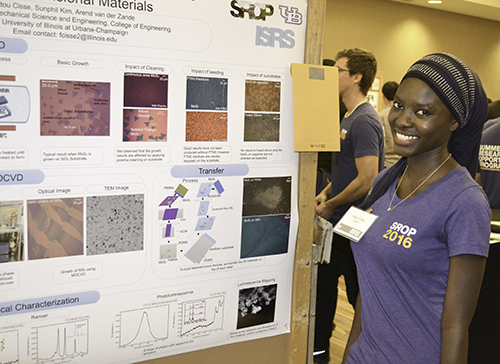
nano@illinois REU participant Fatou Cisse, a rising sophomore in chemical engineering at the University of Buffalo, who spent the summer researching nanotechnology in Arend van der Zande’s lab.
During the summer of 2016, ten undergraduate students learned about nanotechnology as part of the NSF-funded nano@illinois Research Experience for Undergraduates (REU). While spending the summer performing research in the labs of some of Illinois’ premier researchers, the students not only learned a lot about the area in nanotechnology that they were studying; they learned what grad school is like and got some pointers on how to apply. Finally, many of them discovered that they liked research…a lot. In fact, some even decided that the area they researched over the summer was the area they wanted to concentrate on in the future.
Eric Wynne
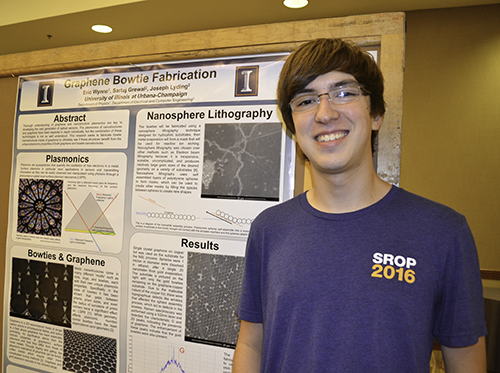
nano@illinois REU undergrad Eric Wynne, a rising sophomore in Engineering Physics at Illinois
In fact, Eric Wynne, a rising sophomore in Engineering Physics here at Illinois, intends to address the topic he researched sooner, rather than later.
Wynne participated in the nano@illinois REU because he wanted to be in on some ground-breaking research about a nano-material that's been in the news— graphene:
“Graphene is a nano material that has gotten a lot of publicity recently; it has a lot of interesting qualities that people have been looking at,” says Wynne. “So I was sort of attracted to that because I thought it would be really interesting to work with that, and help discover all the sorts of new things that it can do.”
Did Wynne gain any new skills as a result of spending his summer researching graphene?
“Most definitely,” he acknowledges. “Prior to the summer, I hadn’t actually worked in a laboratory, so it was really nice to actually be doing things in a lab and designing processes that people have never done before. It’s really cool to look at something that nobody else has looked at. I definitely think I’ve gained a lot of skills.”
In addition to gaining some skills, Wynne believes his experience influenced his choice of careers as well.
“I had an interest in nanomaterials before this,” Wynne admits, “but I certainly didn’t understand the depth of the field, and how many different aspects there were to it. So I definitely think it has made me consider this field a lot more and piqued my interest in it.”
In fact, his experience piqued his interest so much that he admits, “I’m actually going to be continuing my research on this topic during the school year. In the same lab. Professor Joseph Lyding’s lab.”
Zachary Roga
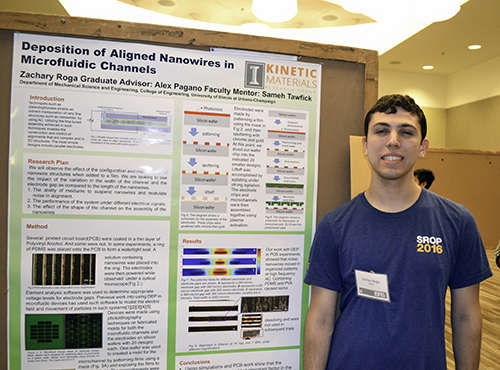
nano@illinois REU participant Zachary Roga.
Like Wynne, Zachary Roga believes his experience this summer in Sameh Tawfick’s lab will also have a major impact on his career path.
“I think this definitely did help me steer more into the nanotech industry,” admits Roga. “And I think it could push me further down an academic path.”
A rising junior studying Biological Engineering at Cornell University, Roga says he’s been interested in nanotechnology and worked with micrologic devices in the past, so when he had an opportunity to work in a similar area here, he was “pretty excited to take the opportunity and learn more about the process.”
Some of the new skills he learned over the summer include microfabrication and photolithography techniques, silonization, and how to use a mask to expose photoresist.
“I don’t know if this program was a perfect representation of what grad school is like," he explains, "but I definitely understand the research environment better than I have.”
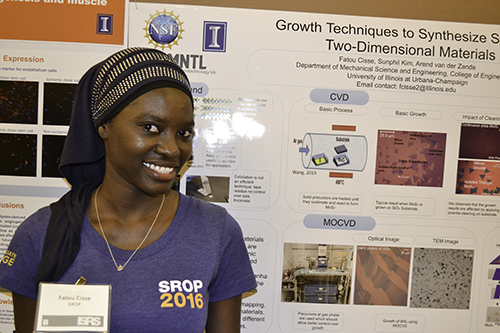
nano@illinois REU participant Fatou Cisse presenting her poster at the Illinois Summer Research Symposium.
Fatou Cisse
Like Wynne and Roga, Fatou Cisse, a rising sophomore majoring in chemical engineering at the University of Buffalo, also got involved in the nano@illinois REU because of a prior interest in nanotechnology: “I came here because I was interested in nanomaterials and I wanted to learn more about it. I also wanted to learn more about the University of Illinois.”
Although this summer doing research in Arend van der Zande’s lab was her first research experience, she was pretty much convinced that graduate school and research are in her future. Regarding research, she says, “I think it’s great. And I think it’s very useful. And because of that I will consider going to grad school. And I for sure want to go into research.”
Will her research be in nanotechnology? “For right now, Yes,” she says. “Unless I find something else that I find very interesting.”
Regarding any new skills she learned this summer, Cisse indicates that, “Everything I did this summer was new. I learned everything from scratch. Like I learned growing material from scratch. And I learned their applications.”
Boris Djiguemede
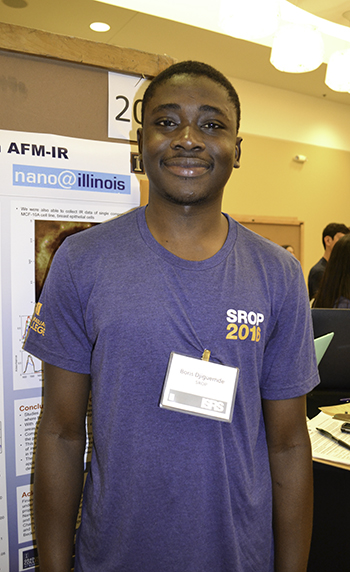
nano@illinois REU participant Boris Djiguemede.
Another REU participant who found out what what grad school is like through his research experience was Boris Djiguemede, a junior studying bio engineering at the University of Maryland.
“We had a lot of programs that were designed to walk us through the process of going to grad school...” he explains, “the application process and everything. I’m definitely more aware of what I will be doing if I do go to grad school.”
Djiguemede recalls his reaction when he first heard about the nano@illlinois REU. “I thought it was tempting, and it looked very cool, so I applied to it.” And the REU lived up to the hype: “It has been very cool so far,” he reports.
Djiguemede has done research before, but “not in an intensive way,” he says. Despite his previous experience in research, he says he definitely gained a lot of new skills in Rohit Bhargava’s lab: “I learned more about a new technique,” he explains, “a new imaging tool that not many people know about, and I was also able to polish my skills on computer design programs and softwares. Yes, I definitely enjoyed the experience.”
Regarding his career aspirations, Djiguemede reports that he’d like to become a doctor/researcher. All along, he’s wanted to go to med school: “But I don’t want to take everything I learn and just become a doctor and look at patients all day,” he admits. “I’ve always wanted to do something with whatever I’m learning right now. I’m still thinking about being a doctor, but I definitely want to do some kind of research that will make me a better doctor.”
Daniel Jacques
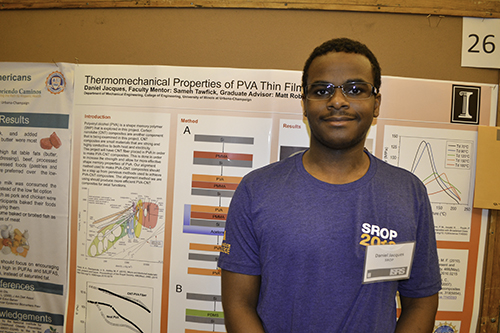
Daniel Jacques, a nano@illinois REU participant who is a rising sophomore studying medical engineering at the University of Maryland.
Another student who will most likely go into research as a result of his experience this summer is Daniel Jacques, a rising sophomore studying medical engineering at the University of Maryland.
Jacques reports that the nano@illinois REU was his first research experience. What did he think of it? “It’s a lot of work,” he admits, “and it’s really you doing your own thing. You make your own speculation and then you do as many things as possible, as fast as possible. That’s what I’ve learned so far."
His research this summer in Sameh Tawfick’s lab involved working with carbon nanotubes for shape memory effects. “Shape memory is when I can take a polymer and heat it up to a certain temperature and deform it,” he explains. “Once it cools down, you can change it to whatever you want, and when you heat it back up…" He goes on to explain that it reverts back to the original shape you created, similar to memory metals.
Jacques says he learned a lot more chemistry terms this summer. “I’m a mechanical engineer, so chemistry isn’t my strongest. I took a couple of general chemistry classes so I was able to apply some of my knowledge, but now I’m learning a lot more stuff. Such as stress strain, the thermodynamic properties of stuff. These are all things I will learn later on in my academic career, so I’m just kind of getting a head start on those classes.”
Jacques says there’s a pretty good chance that he’ll go into research. “Especially because my program at my school, they really want people to go out and do an internship over the summer or take classes,” he explains. “And I got this internship. And they really want you to do this; they want people to build their network, their experience, and their knowledge; they really want people to get into graduate school; my program is all about getting people into graduate school.”
Jacques acquired some new skills this past summer that he says will help him as a student: making PowerPoint presentations in a different sort of way, making a personal statement, and making a CV. “I feel like I can carry that on to my school and other internship positions. And jobs,” he adds.
The PIs of the nano@illinois REU, Catherine Murphy and Umberto Ravaioli, stated in their proposal to the National Science Foundation that the ultimate goal of their REU is "to solidify the students' interest in graduate research and education and contribute to the diversity of the national workforce pipeline..." Based on the number of participants who indicated that they intend to continue on to graduate school in nanotechnology, the project appears to be achieving its goal.
Author/Photographer: Elizabeth Innes, Communications Specialist, I-STEM Education Initiative
More: MNTL, nano@illinois , REU, REU: nano@illinois, Summer Research, Undergrad, 2016
For additional istem articles about REUs, see:
- POETS REU Helps Illinois Undergrad Sabrina Yin Choose Her Career Path
- nano@illinois REU Undergrads Experience Growth Via Nanotechnology Research
- Undergrads in Bioimaging REU Experience What Research, Graduate School Is Like
- Bioimaging REU's Matt Kavanaugh Experiences Cancer Research at Illinois
- Wendy Reyes Learns Life Skills—and to Like Research—in Bioimaging REU













.jpg)
















